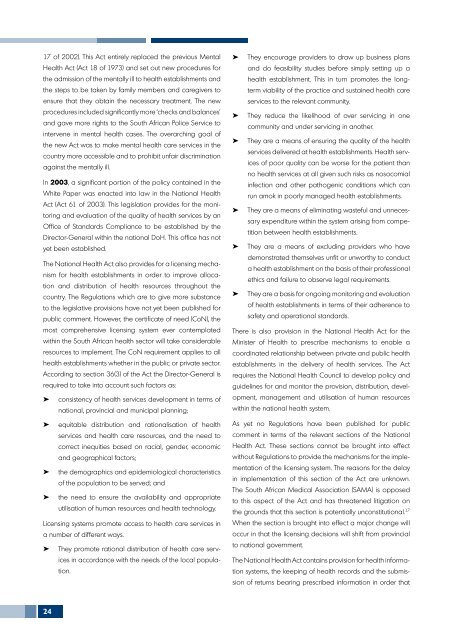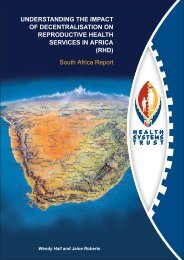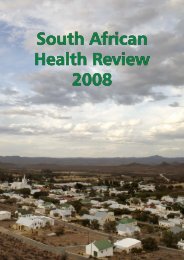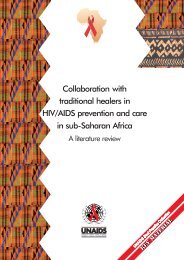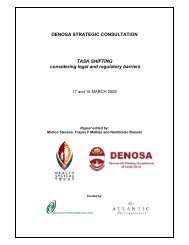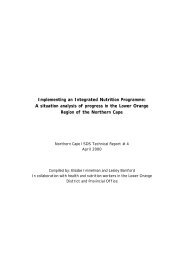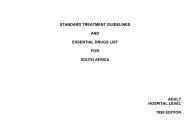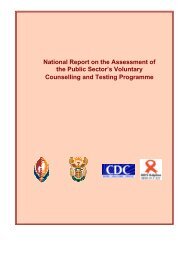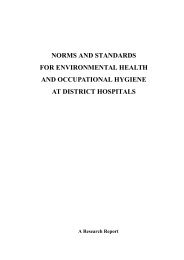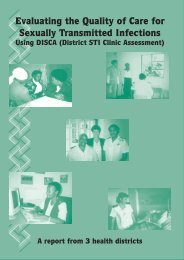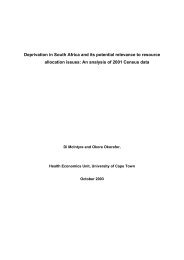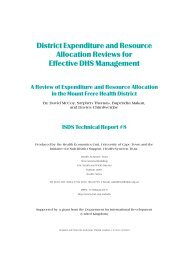SAHR 2007 - Health Systems Trust
SAHR 2007 - Health Systems Trust
SAHR 2007 - Health Systems Trust
You also want an ePaper? Increase the reach of your titles
YUMPU automatically turns print PDFs into web optimized ePapers that Google loves.
17 of 2002). This Act entirely replaced the previous Mental<br />
<strong>Health</strong> Act (Act 18 of 1973) and set out new procedures for<br />
the admission of the mentally ill to health establishments and<br />
the steps to be taken by family members and caregivers to<br />
ensure that they obtain the necessary treatment. The new<br />
procedures included significantly more ‘checks and balances’<br />
and gave more rights to the South African Police Service to<br />
intervene in mental health cases. The overarching goal of<br />
the new Act was to make mental health care services in the<br />
country more accessible and to prohibit unfair discrimination<br />
against the mentally ill.<br />
In 2003, a significant portion of the policy contained in the<br />
White Paper was enacted into law in the National <strong>Health</strong><br />
Act (Act 61 of 2003). This legislation provides for the monitoring<br />
and evaluation of the quality of health services by an<br />
Office of Standards Compliance to be established by the<br />
Director-General within the national DoH. This office has not<br />
yet been established.<br />
The National <strong>Health</strong> Act also provides for a licensing mechanism<br />
for health establishments in order to improve allocation<br />
and distribution of health resources throughout the<br />
country. The Regulations which are to give more substance<br />
to the legislative provisions have not yet been published for<br />
public comment. However, the certificate of need (CoN), the<br />
most comprehensive licensing system ever contemplated<br />
within the South African health sector will take considerable<br />
resources to implement. The CoN requirement applies to all<br />
health establishments whether in the public or private sector.<br />
According to section 36(3) of the Act the Director-General is<br />
required to take into account such factors as:<br />
➤ consistency of health services development in terms of<br />
national, provincial and municipal planning;<br />
➤ equitable distribution and rationalisation of health<br />
services and health care resources, and the need to<br />
correct inequities based on racial, gender, economic<br />
and geographical factors;<br />
➤ the demographics and epidemiological characteristics<br />
of the population to be served; and<br />
➤ the need to ensure the availability and appropriate<br />
utilisation of human resources and health technology.<br />
Licensing systems promote access to health care services in<br />
a number of different ways.<br />
➤ They promote rational distribution of health care services<br />
in accordance with the needs of the local population.<br />
➤ They encourage providers to draw up business plans<br />
and do feasibility studies before simply setting up a<br />
health establishment. This in turn promotes the longterm<br />
viability of the practice and sustained health care<br />
services to the relevant community.<br />
➤ They reduce the likelihood of over servicing in one<br />
community and under servicing in another.<br />
➤ They are a means of ensuring the quality of the health<br />
services delivered at health establishments. <strong>Health</strong> services<br />
of poor quality can be worse for the patient than<br />
no health services at all given such risks as nosocomial<br />
infection and other pathogenic conditions which can<br />
run amok in poorly managed health establishments.<br />
➤ They are a means of eliminating wasteful and unnecessary<br />
expenditure within the system arising from competition<br />
between health establishments.<br />
➤ They are a means of excluding providers who have<br />
demonstrated themselves unfit or unworthy to conduct<br />
a health establishment on the basis of their professional<br />
ethics and failure to observe legal requirements.<br />
➤ They are a basis for ongoing monitoring and evaluation<br />
of health establishments in terms of their adherence to<br />
safety and operational standards.<br />
There is also provision in the National <strong>Health</strong> Act for the<br />
Minister of <strong>Health</strong> to prescribe mechanisms to enable a<br />
coordinated relationship between private and public health<br />
establishments in the delivery of health services. The Act<br />
requires the National <strong>Health</strong> Council to develop policy and<br />
guidelines for and monitor the provision, distribution, development,<br />
management and utilisation of human resources<br />
within the national health system.<br />
As yet no Regulations have been published for public<br />
comment in terms of the relevant sections of the National<br />
<strong>Health</strong> Act. These sections cannot be brought into effect<br />
without Regulations to provide the mechanisms for the implementation<br />
of the licensing system. The reasons for the delay<br />
in implementation of this section of the Act are unknown.<br />
The South African Medical Association (SAMA) is opposed<br />
to this aspect of the Act and has threatened litigation on<br />
the grounds that this section is potentially unconstitutional. 17<br />
When the section is brought into effect a major change will<br />
occur in that the licensing decisions will shift from provincial<br />
to national government.<br />
The National <strong>Health</strong> Act contains provision for health information<br />
systems, the keeping of health records and the submission<br />
of returns bearing prescribed information in order that<br />
24


